Related Research Articles
Jazz is a music genre that originated in the African-American communities of New Orleans, Louisiana, in the late 19th and early 20th centuries, with its roots in blues, ragtime, European harmony and African rhythmic rituals. Since the 1920s Jazz Age, it has been recognized as a major form of musical expression in traditional and popular music. Jazz is characterized by swing and blue notes, complex chords, call and response vocals, polyrhythms and improvisation.

The Original Dixieland Jass Band (ODJB) was a Dixieland jazz band that made the first jazz recordings in early 1917. Their "Livery Stable Blues" became the first jazz record ever issued. The group composed and recorded many jazz standards, the most famous being "Tiger Rag". In late 1917, the spelling of the band's name was changed to Original Dixieland Jazz Band.

A jazz band is a musical ensemble that plays jazz music. Jazz bands vary in the quantity of its members and the style of jazz that they play but it is common to find a jazz band made up of a rhythm section and a horn section.

Charles Joseph "Buddy" Bolden was an American cornetist who was regarded by contemporaries as a key figure in the development of a New Orleans style of ragtime music, or "jass", which later came to be known as jazz.

Edward "Kid" Ory was an American jazz composer, trombonist and bandleader. One of the early users of the glissando technique, he helped establish it as a central element of New Orleans jazz.

Willie Gary "Bunk" Johnson was an American prominent jazz trumpeter in New Orleans. Johnson gave the year of his birth as 1879, although there is speculation that he may have been younger by as much as a decade. Johnson stated on his 1937 application for Social Security that he was born on December 27, 1889. Many jazz historians believe this date of birth to be the most accurate of the various dates Johnson gave throughout his life.

Barnett, Kyle (2020). Record cultures: the transformation of the U.S. recording industry. Ann Arbor, [Michigan]: University of Michigan Press. p. 42. ISBN 978-0-472-12431-2.
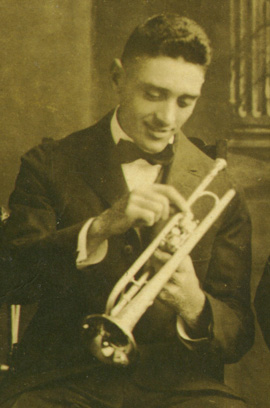
Frank Joseph Christian was an American early jazz trumpeter.

Kenneth Sidney "Kenny" Drew was an American-Danish jazz pianist.
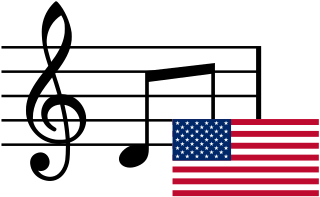
Music in the United States underwent many shifts and developments from 1900 to 1940. The country survived both World War I and the Great Depression before entering World War II in December 1941. Americans endured great loss and hardship but found hope and encouragement in music. The genres and styles present during this period were Native American music, blues and gospel, jazz, swing, Cajun and Creole music, and country. The United States also took inspiration from other cultures and parts of the world for her own music. The music of each region differed as much as the people did. The time also produced many notable singers and musicians, including jazz figure Louis Armstrong, blues and jazz singer Mamie Smith, and country singer Jimmie Rodgers.
Riverside Records was an American jazz record company and label. Founded by Orrin Keepnews and Bill Grauer, Jr, under his firm Bill Grauer Productions in 1953, the label played an important role in the jazz record industry for a decade. Riverside headquarters were located in New York City, at 553 West 51st Street.

The Preservation Hall Jazz Band is a New Orleans jazz band founded in New Orleans by tuba player Allan Jaffe in the early 1960s. The band derives its name from Preservation Hall in the French Quarter. In 2005, the Hall's doors were closed for a period of time due to Hurricane Katrina, but the band continued to tour.

Daniel Moses Barker was an American jazz musician, vocalist, and author from New Orleans. He was a rhythm guitarist for Cab Calloway, Lucky Millinder and Benny Carter during the 1930s.
Louis Thomas Black was prominent Jazz era banjo player, part of the New Orleans Rhythm Kings during the 1920s.
Cape jazz is a genre of jazz that is performed in the very southern part of Africa, the name being a reference to Cape Town, South Africa. Some writers say that Cape jazz began to emerge in 1959 with the formation of The Jazz Epistles, many of whom were from Cape Town, including Abdullah Ibrahim, then known as Dollar Brand. Cape jazz is similar to the popular music style known as marabi, though more improvisational in character. Where marabi is a piano jazz style, Cape jazz in the beginning featured instruments that can be carried in a street parade, such as brass instruments, banjos, guitars and percussion instruments.
Jazz guitarists are guitarists who play jazz using an approach to chords, melodies, and improvised solo lines which is called jazz guitar playing. The guitar has fulfilled the roles of accompanist and soloist in small and large ensembles and also as an unaccompanied solo instrument.
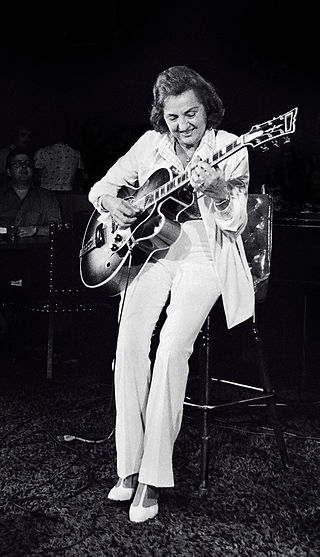
Mary Osborne was an American jazz guitarist. She began performing at a young age and was featured on a radio program in North Dakota, where she grew up. In New York City during the 1940s, she played with jazz musicians such as Dizzy Gillespie, Billie Holiday, Art Tatum, Coleman Hawkins, and Thelonious Monk. After moving to California in 1968, she and her husband founded the Osborne Guitar Company.
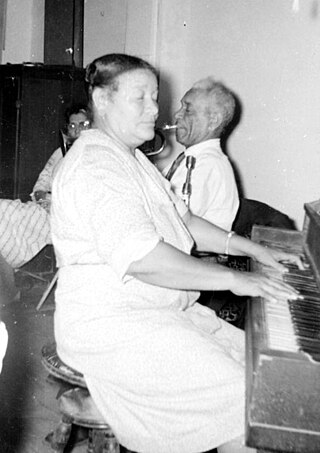
Wilhelmina Madison Goodson, known professionally as Billie Pierce, was an American jazz pianist and singer, who performed and recorded with her husband De De Pierce. Her style has been described as a "potent mixture of barrelhouse, boogie-woogie, and ragtime". After settling in New Orleans in 1930, she played in the bands of A.J. Piron, Alphonse Picou, Emile Barnes, and George Lewis.
Dixieland jazz, also referred to as traditional jazz, hot jazz, or simply Dixieland, is a style of jazz based on the music that developed in New Orleans at the start of the 20th century. The 1917 recordings by the Original Dixieland Jass Band fostered awareness of this new style of music.
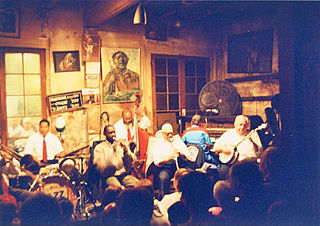
Jeanette Kimball, née Jeanette Salvant, was a classically trained American jazz pianist who played in jazz bands for more than 70 years, mostly in New Orleans. She received the Black Men of Labor Jazz Legacy Award in 1998.
References
- "Buddy Christian". The New Grove Dictionary of Jazz . 2nd edition, ed. Barry Kernfeld.